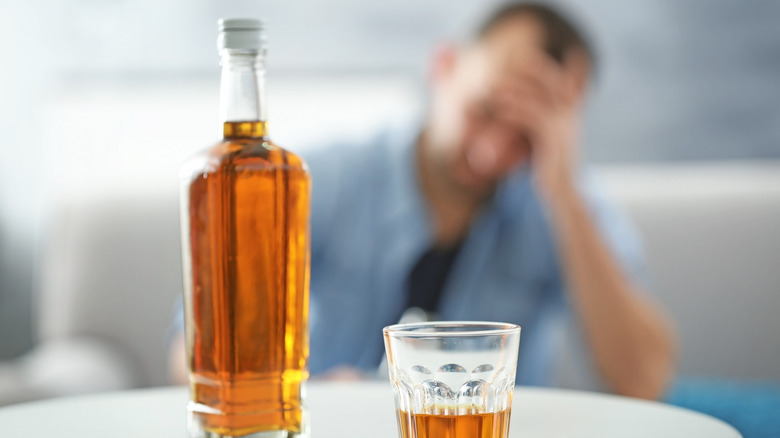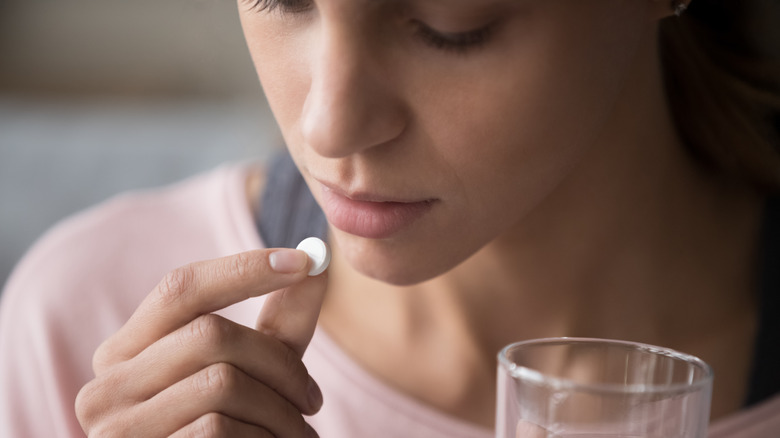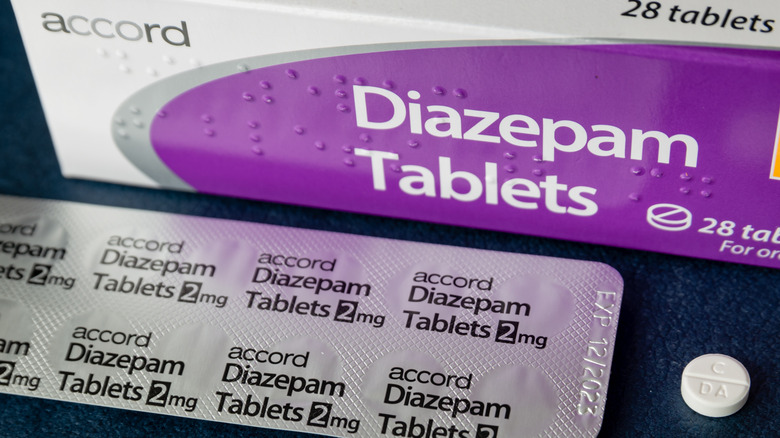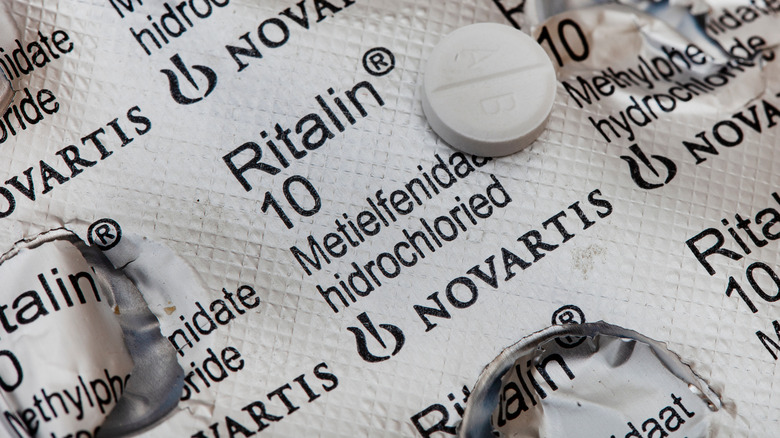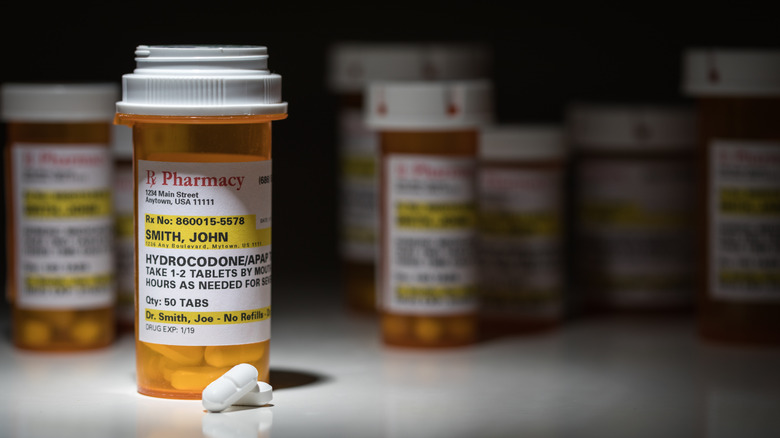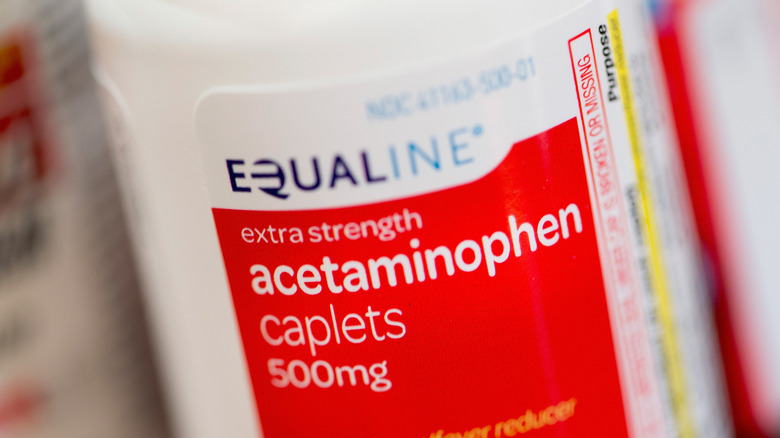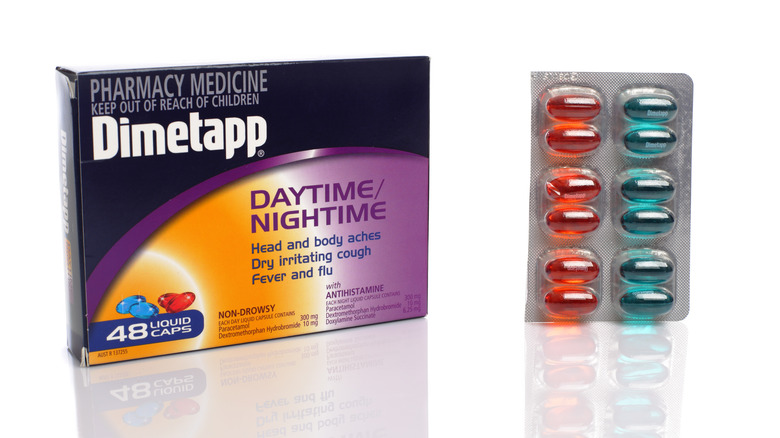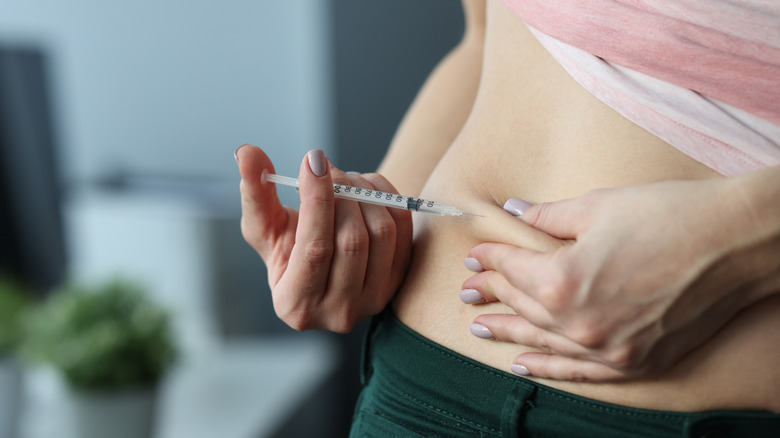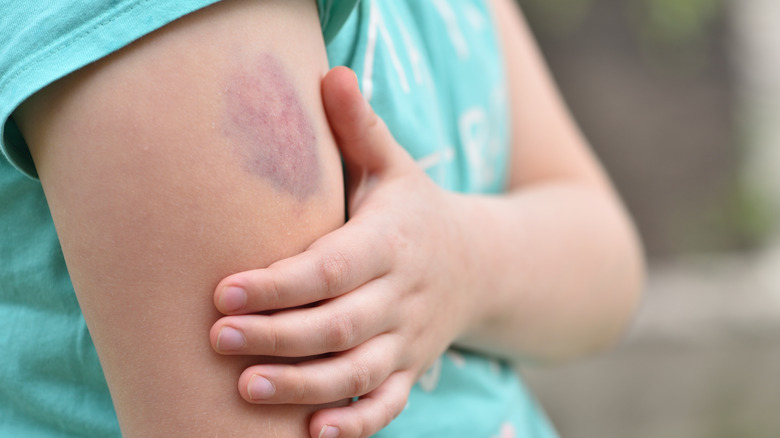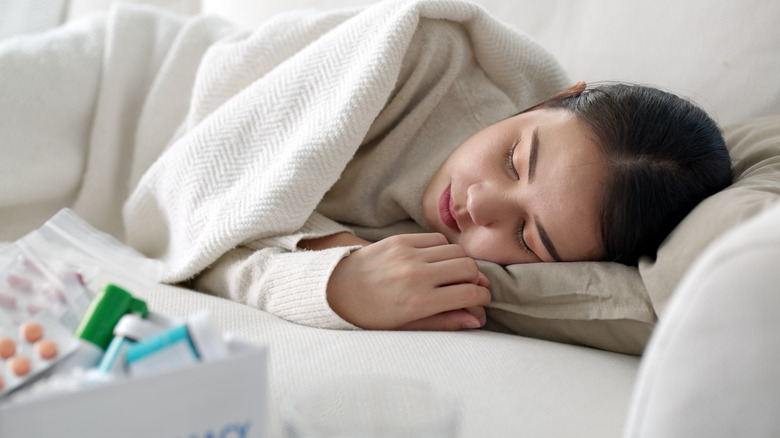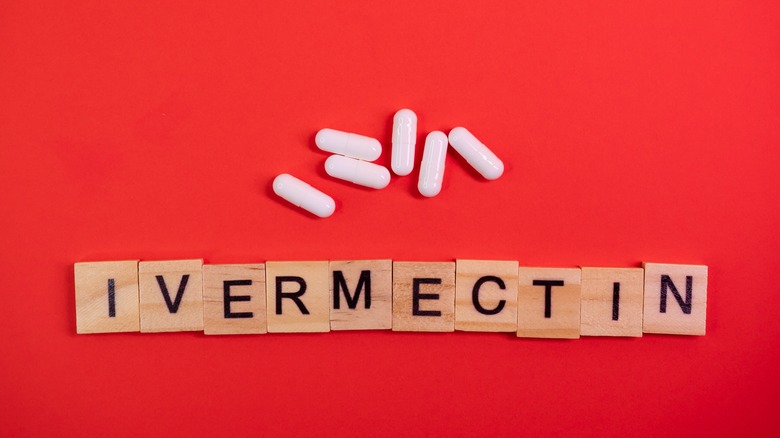Medication You Should Never Mix With Alcohol
It was 36 years ago when the very first "This is your brain, this is your brain on drugs" commercial aired. You know, the one where the egg is "your brain," and the egg, cracked open and scrambling on a skillet, is "your brain on drugs." It's an iconic ad, says AdWeek, but we couldn't help but notice one deficiency in the concept itself. That would be that the ad never got around to mentioning what happens to your brain — and your body — when you mix certain medications with alcohol.
Spoiler alert: It can be dangerous, if not life-threatening, depending upon the medication. Remember Corey Monteith of "Glee" fame? He died from an alcohol and heroin interaction in 2013 (via Drugs.com). American professional wrestler Chyna died of an alcohol and prescription medication interaction in 2016. But it's not just celebrities. Given the percentage of adults who drink at least occasionally (70%, per the National Institute of Alcohol Abuse and Addiction), the CDC's estimate that nearly 50% of adults take at least one prescription drug per day, and the nearly 80% of adults who sometimes take over-the-counter drugs (according to a 2021 study in the International Journal of Environmental Research and Public Health), "some concurrent use of alcohol and medications is inevitable," as the NIAA pointed out, going as far back as 1995.
With that in mind, please be aware of the following medications that you should never mix with alcohol.
Certain antibiotics are downright dangerous to mix with alcohol
You've probably noticed that pretty much every antibiotic comes with a warning about taking it with alcohol. It's pretty standard, according to a 2020 academic paper published in the American Society for Microbiology Journal of Antimicrobial Agents and Chemotherapy. But the warning is imprecise. Not all antibiotic medications react the same way with alcohol. For example, some antibiotics may be rendered less effective at killing bacteria when mixed with alcohol, including erythromycin (or what you may think of as a Z-Pack). Others are associated with toxicity when mixed with alcohol.
The latter category includes metronidazole, also known as Flagyl. When taken with alcohol, Flagyl has been associated with potentially severe gastric upset, including vomiting and nausea. The same is true of certain cephalosporin-based antibiotics, which have even been associated with some resulting deaths when mixed with alcohol. They include the five deceased people accounted for in a 2014 study published in the International Journal of Surgery. Another antibacterial medication associated with toxicity when mixed with alcohol is sulfamethoxazole/trimethoprim, which can cause your heartbeat to accelerate, as well as nausea, vomiting, and other effects. This one may be sold under the brand names Bactrim or Sulfatrim.
Then there are the antibiotics that magnify alcohol's effects, including Griseofulvin. So, it's wise to heed the package warning — or at the very least, talk to your doctor before drinking while taking an antibiotic. And please don't make these common antibiotic mistakes.
Some allergy relief medications can make you even sleepier when mixed with alcohol
If you have allergies, you may have more than a passing familiarity with antihistamines. Antihistamines are medications that work against a compound called histamine. Histamine is released by your immune system when confronted with an allergen, or any agent that your immune system perceives as a threat (via Healthline). In fact, there is a fifty-fifty chance that you used some allergy medication or another during the course of 2021, according to data provided by Statista. Since there is also a roughly 70% chance that you drink alcohol on occasion (per NIAAA), it is worth considering why it is that certain allergy medications should not be taken with alcohol.
Specifically, diphenhydramine, the active ingredient in the popular allergy medication Benadryl, has a known sedative effect. That means it can cause symptoms like sleepiness and a decrease in motor skills. Alcohol, which is a central nervous system depressant (per Addiction Center), magnifies the sedative effects of Benadryl and other diphenhydramine-based medications, according to a 1999 paper published in Alcohol Research and Health. Diphenhydramine is found in some cold medications and some sleep-aids as well (via KnowYourOTCs).
In addition to diphenhydramine, some other antihistamines (such as the active ingredient in ChlorTrimeton) may have a sedative effect, and should therefore not be taken with alcohol. But not all antihistamines are in this category. That includes all "non-sedating antihistamines" (e.g. Claritin and Zyrtec).
Xanax, Valium, and the like plus alcohol? No.
Some of the most dangerous medications to mix with alcohol are benzodiazepines, according to a 1999 paper in Alcohol Research and Health. Benzodiazapines are "depressants that produce sedation and hypnosis, relieve anxiety and muscle spasms, and reduce seizures," per the United States' DEA. Some well-known examples of benzodiazapines are Ativan, Klonopin, Valium, Xanax, and Halcion. Like any prescription drug, benzos, as they are sometimes known, are available illegally "on the street." Rohypnol, which is illegal in the U.S. and known primarily for its use in connection with date-rape, is a particularly potent benzo, according to the Eastern Kentucky University Police Department.
Since alcohol is also a depressant, combining alcohol with benzodiazepine medications delivers at least double the sedative effect, according to DrugAbuse.com. The result may be "severe loss of coordination, coma, and significantly increase[d] risk of overdose and death." In addition, the 1999 paper referenced above suggests that mixing alcohol and benzodiazepines may result in an increased risk of memory impairment, which already comes with taking benzos and consuming alcohol independently (hence the use of Rohypnol as a date rate drug, because it can induce amnesia, especially when taken with alcohol).
Stimulants, both legal and illegal, are dangerous to mix with alcohol
Whereas mixing benzodiazapine medication with alcohol can create a synergistic effect that leads to excessive sedation, mixing stimulants of various kinds (including coffee) with alcohol can decrease alcohol's sedative effects, according to DrugAbuse.com. At the same time, stimulants do not act as an "antidote" to alcohol. If you drink coffee to feel more awake after drinking alcohol, you may indeed feel more awake. However, your blood alcohol content will not diminish as a result, and neither will the alcohol's effect on your liver and other organs.
While coffee is not unsafe to mix with alcohol (except to the extent that it might make you feel as if you are safe to drive when you are actually intoxicated), you're taking a bigger risk when you mix prescription stimulant medications such as Ritalin and Adderall with alcohol. The greater the stimulant effect of a medication, the greater the risk of drinking more alcohol than is safe for your body without risking alcohol poisoning (or at least, an unusually difficult hangover) the next day. And street drug stimulants like cocaine, speed, and meth, and variants thereof may have an even greater stimulant effect. Further, when cocaine is combined with alcohol in the liver, it creates a "byproduct" known as cocaethylene, which is a "dangerous compound that increases the chance of overdose."
All opioid medications can be deadly when mixed with alcohol
The death of actor and singer Cory Monteith has been attributed to a lethal combination of alcohol and heroin, according to Drugs.com. Heroin is a potent street drug opioid that is frequently associated with overdose deaths, with or without alcohol interaction. Prescription opioids medications such as oxycodone and hydrocodone (more commonly known as Oxycontin and Vicodin), as well as fentanyl and morphine, can also be deadly when taken in combination with alcohol.
The word "opioid" derives from "opium," which is a drug known for engendering a sense of euphoria, as well as pain relief and sedation. Opioids are prescribed for severe and/or intractible pain. "Alcohol and opiates also make for a particularly lethal combination," according to DrugAbuse.com, which goes on to say that opioid medications are known to "seriously depress the central nervous system," and alcohol further enhances the depressant effects. Although sleepiness and a decrease in motor skills are common risks of combining the two agents (via Alcohol Research and Health), the dangers in each case are exacerbated by the fact that both alcohol and opioids inhibit a person's coughing reflex and otherwise slow their breathing. "Not surprisingly, respiratory arrest is particularly common with this combination," DrugAbuse.com notes. People taking both together also run the risk of choking on food and other objects.
Tylenol and other drugs containing acetaminophen can damage organs when mixed with alcohol
Acetaminophen (also known as paracetamol) is a pain relieving agent, per MedlinePlus. You may recognize it as the active ingredient in Tylenol. It's an effective fever reducer. It also provides effective pain relief for mild to moderate pain of all kinds, from headaches to a stubbed pinky toe and everything in between. It can also alleviate pain associated with osteoarthritis (the type of arthritis that is related to age and injury, as opposed to an autoimmune condition). According to MedlinePlus, this kind of analgesic works by cooling the body and raising the pain threshold. Acetaminophen is valued for its dearth of serious side effects, but when mixed with alcohol, acetaminophen has been associated with bleeding of the lining of the stomach, abdominal swelling, and liver damage (via Addiction Center).
"The liver can simultaneously metabolize the ingredients in Acetaminophen and alcohol," Addiction Center notes. But combining the two risks overburdening the liver, which may cause liver damage. In addition, research suggests that taking acetaminophen medications with alcohol may damage the kidneys as well. Acetaminophen is sometimes found in combination in certain opioid medications (e.g. codeine and oxycodone). It can also be found in some cold and/or cough medications (via Alcohol Research and Health).
Cold and cough medications can be problematic when mixed with alcohol
"It isn't just mixing medications that can harm you," American Addiction Centers warns on its website. "Having just a few drinks while taking one can be fatal." What the AAC is referring to in this case is cold and flu medications, both prescription and over-the counter, and for myriad reasons.
First, many cold and flu medications contain multiple ingredients to address multiple symptoms associated with colds and flu. That means that they may contain any one of the following ingredients, which are known to be dangerous when mixed with alcohol: acetaminophen (aka paracetemol, the combination of which can cause liver and kidney damage as well as stomach bleeding and related symptoms, per Addiction Center), diphenhydramine (the active ingredient in the popular allergy medication Benadryl, whose sedative effects are heightened by alcohol, per KnowYourOTCs), or an opioid pain reliever (which can be found in the form of codeine, for example, in certain prescription cough syrups).
Further, some cold and flu medications may contain some level of alcohol, according to AAC. This is especially true of cold and flu combinations intended to treat coughing. Accordingly, it's important to read the labels carefully when shopping for cold and flu relief. "Pay attention to overlapping ingredients and any alcohol warnings," AAC advises. "If you have any questions about what is safe to take, you can call your doctor or speak to a pharmacist." You can find a list of alcohol-containing drugs here.
Don't mix alcohol with these type 2 diabetes medications
Type 2 diabetes means that the way your body metabolizes glucose is impaired, either because your pancreas does not produce enough insulin or because your cells cannot respond appropriate to insulin (per Mayo Clinic). As a result, as a general rule, there is too much sugar circulating in the bloodstream, which can damage vital organs. Consuming alcohol is known to lower blood glucose to below-normal levels within minutes of drinking and up to 12 hours afterward, according to Healthline. This may be further exacerbated by mixing alcohol with certain medications prescribed to treat type 2 diabetes. These include the drugs known as sulfonylureas (e.g., the generic tolbutamide). According to WebMD, consuming alcohol with sulfonylureas can lead to hypoglycemia, which refers to abnormally low blood glucose levels.
The symptoms that go along with hypoglycemia include blurred vision, increased thirst and urination, and even altered consciousness, all of which come with their own inherent risks. In addition, mixing alcohol and sulfonylureas can raise your apparent tolerance to alcohol without protecting you from the risks of alcohol toxicity, including everything from hangover to loss of consciousness to death. Several sulfonylurea medications, including tolbutamide, chlorpropamide (brand name: Diabinese), glyburide (brand names: DiaBeta, Glynase, and Micronase), and tolazamide (which is sold as a generic drug), have also been associated with potentially severe gastric upset, including vomiting and nausea, a syndrome known in medical circles as a disulfiram-like reaction.
Taking alcohol with anti-clotting drugs can be deadly
The medication warfarin is an anti-coagulant, which means that it thins the blood and helps prevent abnormal blood clots from forming (per MedlinePlus). Doctors prescribe warfarin for people who have experienced a heart attack, people who have an irregular heartbeat, and people at risk for stroke for one reason or another, among others. If you've been prescribed warfarin, it is important to abstain from even "small amounts of alcohol," according to a 1999 paper published in Alcohol Research and Health. Despite that, Healthline suggests there are "no specific recommendations against drinking alcohol while you take warfarin." Still, as Healthline acknowledges, the fact is that "alcohol can affect how warfarin works."
Research suggests that drinking alcohol even casually while on warfarin increases the medication's anti-clotting effects. This raises the risk of increased bleeding, which in turn presents the risk of abnormal bruising, internal bleeding, and difficulty in healing from wounds (per Medical News Today). On the other hand, people with alcoholism and others who chronically drink alcohol may not respond to warfarin adequately without higher-than-normal doses. "Thus, alcohol consumption can result in dangerously high or insufficient warfarin activity, depending on the patient's drinking pattern," per the 1999 paper referenced above, and "therefore, patients taking warfarin generally should avoid alcohol." Oh, and if you're taking warfarin or other blood thinners, you should also stay away from foods that are rich in vitamin K.
Sleep aid medications don't mix well with alcohol
Insomnia affects around 40% of American adults over the course of any given year, according to a 2020 overview published in the American Journal of Managed Care. But we probably don't have to tell you that, because even if you have somehow managed to elude insomnia, it is virtually impossible to elude all of the advertisements for various sleep aids, both available by prescription and over-the counter.
Since alcohol is a central nervous system depressant, it is commonly used as a non-medical sleep aid, despite the fact that alcohol can actually harm sleep quality (via WebMD). When alcohol is consumed along with prescription sleep aids, it can do even greater harm than simply interfering with sleep quality. In fact, 14% of all ER visits and hospitalizations resulting from Ambien abuse involve the consumption of alcohol (per American Addiction Centers). Additionally, combining alcohol and Ambien also increases the likelihood of a transfer to an intensive care unit.
Even sleep aids that are available over-the-counter and as "herbal" remedies and supplements can be dangerous when taken with alcohol, according to a 1999 paper published in Alcohol Research and Health. It notes that "chamomile, echinacea, and valerian" may produce "enhanced sedative effects ... when combined with alcohol." The same is true of melatonin supplements, which are intended to enhance the body's natural supply of the hormone, melatonin, which helps regulate sleep (via GoodRx). Conversely, alcohol can also interfere with melatonin's efficacy.
Ask your doctor before using ivermectin with alcohol
A drug by the name of ivermectin, which has been used primarily for treating and preventing parasites in livestock, is also approved for use in humans at "very specific doses" to treat "some parasitic worms," per the FDA. As the COVID-19 pandemic wound its way through 2021, however, some people started advocating for the use of ivermectin to treat and/or prevent the infection caused by the coronavirus, according to NPR. Some of those advocating include a "national network of internal medicine doctors." Nevertheless, as the FDA makes very clear, ivermectin has never been approved for the treatment or prevention of COVID-19, and should not be used for either purpose.
Ivermectin is not only unproven as a treatment or cure for anything but parasites (and typically in animals, not humans). It is also considered dangerous in combination with alcohol. Consuming alcohol while taking ivermectin can increase the activity of the ivermectin in your body, according to Drugs.com. This is problematic, as it can cause various interactions such as "skin rash, swelling, headache, dizziness, weakness, nausea, vomiting, diarrhea, stomach pain, seizure (convulsions), shortness of breath, and numbness or tingling." In fact, ivermectin is currently being investigated as an agent to decrease alcohol cravings — in mice, via negative reinforcement. Whether it can be used in humans also remains to be seen.

